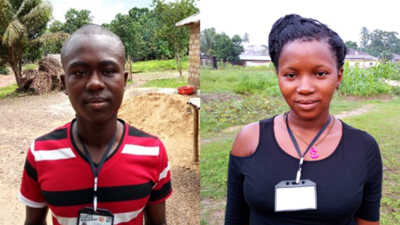Share with:

A child is still dying from malaria every two minutes, with more than 200 million new cases in 2017, the WHO World Malaria Report has revealed. And despite some incredible progress in recent years, that progress has now levelled off - with malaria even on the rise in some countries.
Comic Relief is determined to continue the fight against malaria, including joining forces with GSK to work with communities in some of the most affected areas.
Since the partnership launched in 2015:
21 programmes have been set up in five geographies
With 1,134,794 people benefiting so far
Including 71,610 pregnant women
And 56,812 children under 5
Comic Relief and GSK want to build on this progress to help prevent more lives being needlessly lost to malaria.
One of the partnership’s innovative projects is working with young people fighting malaria in Sierra Leone, where the disease is the leading cause of death.
The project run by Restless Development is training 50 young people to develop new youth-friendly approaches to raise awareness of malaria and to improve access to health care services, especially amongst unmarried mothers and pregnant teenagers and who are often stigmatized, isolated and, together with their babies, are most at risk of malaria. The aim is to empower young people to become young researches within their community, and give them the confidence to use this information to influence decision makers.
Isatu’s story:
Isatu is a young mother of a three-month-old baby. She says that as a young person, she has a key role to play in contributing to the health of her community and believes that the project will create a huge impact in the health-seeking behaviour of young people.
She says: “What really gave me more confidence to aspire to join the project was the fact young breast-feeding mothers as well as pregnant women were encouraged to apply.”
The training built her confidence and enabled her to engage local authorities and other young people on malaria. “I have so far learnt new skills such as team work, data collection skills, leadership and self-confidence,” she adds.
She also says her community has been very receptive to the research she has carried out, looking at the knowledge, attitude and behaviour of young people seeking treatment for malaria.
‘’At least, in my community and the immediate towns and villages, everyone is aware about the havoc that malaria continues to wreck on our children and young people.’’
Baba’s story:
Baba says it is “a dream come true” to be chosen as a young researcher, because he has always had a passion for working with other young people and the issues that affect their aspirations, livelihood, and health.
He says: “My engagement in the malaria research project created a sense of acceptability, especially in relation to some misconceptions about malaria being related to Ebola, which resulted in some people finding it hard to accept our research work. However, our constant sensitisation and intervention brought the curtains down on that.
“I am very confident that the research will have huge impact on increasing the knowledge, behaviour and attitude of my community and the outcome of the project will lay a very strong foundation that will provide the much-needed solution to the deadliest threat to the wellbeing of my community and the immediate villages.”